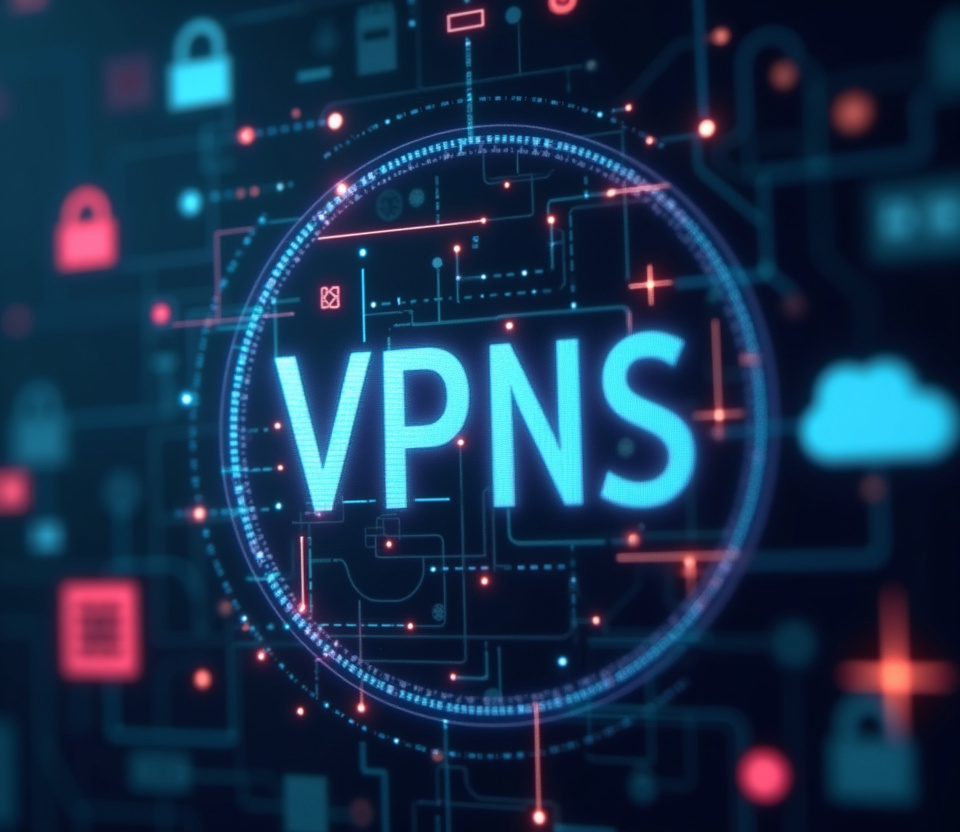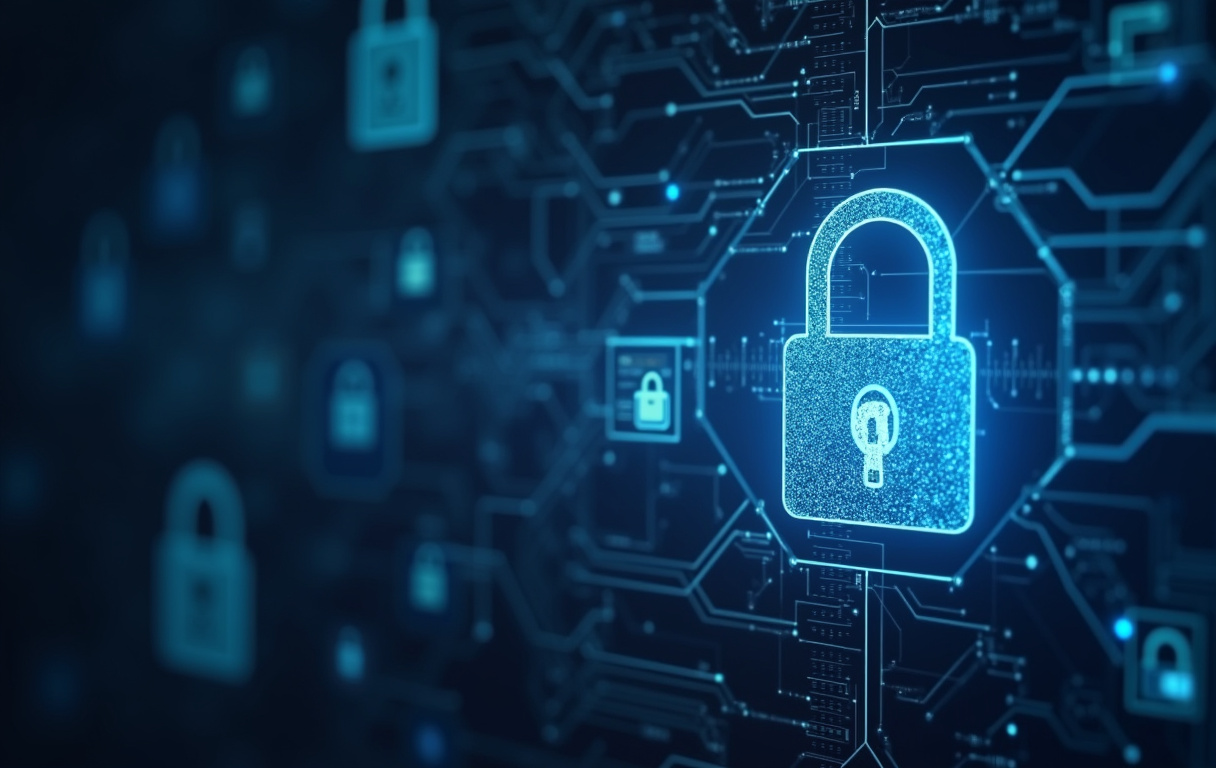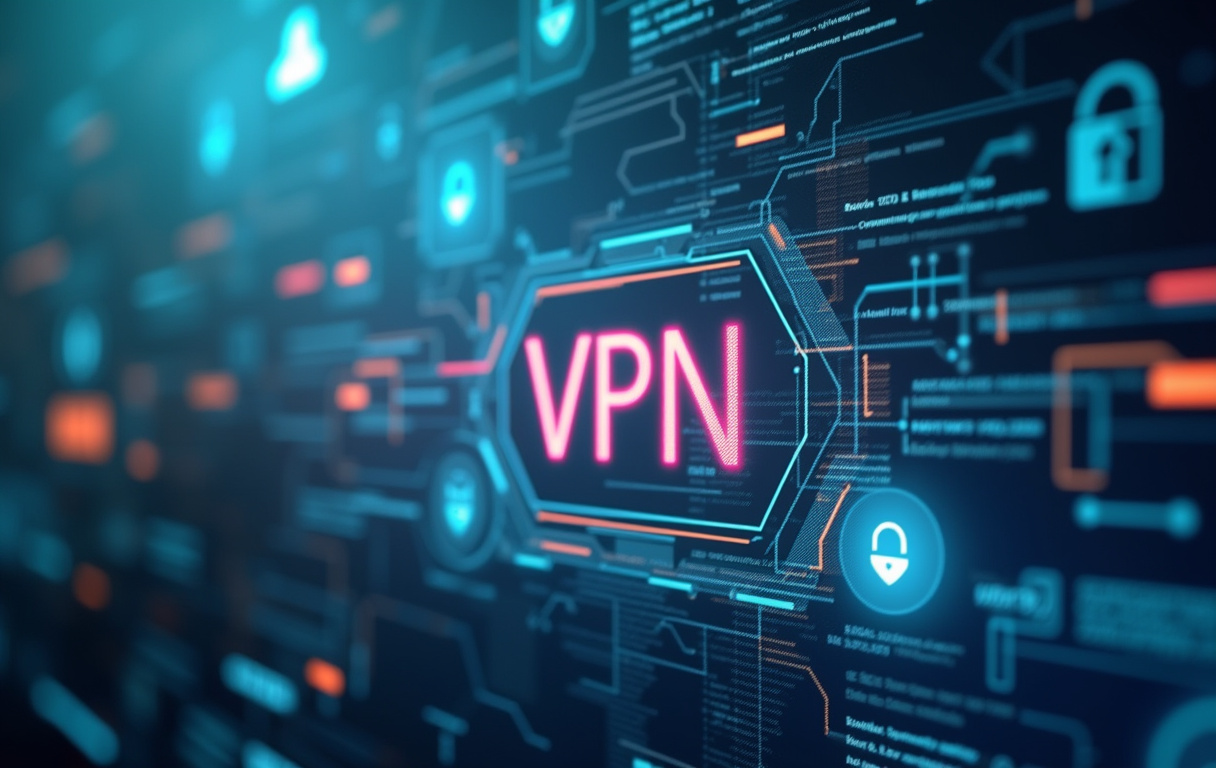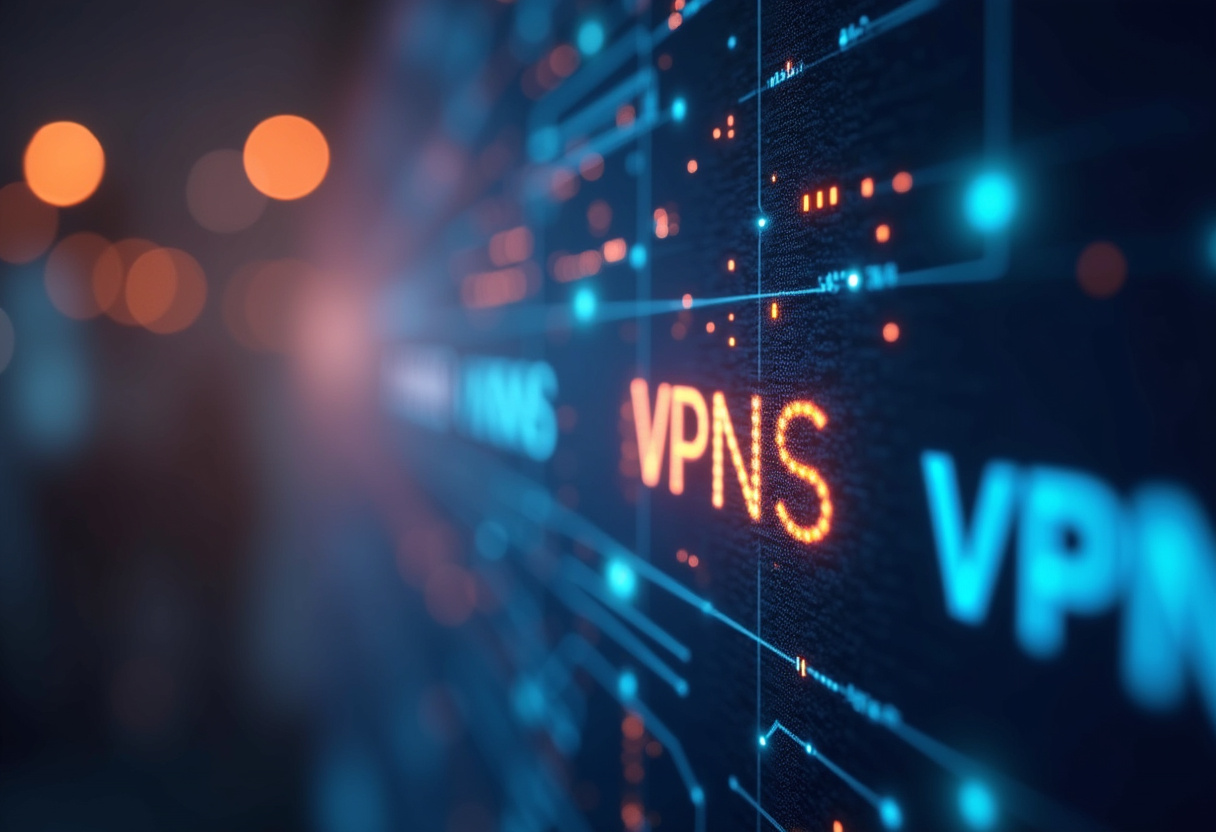VPNs for Home Offices: Creating a Secure Workspace

Table of Contents
home office VPN
The modern professional landscape has undergone a seismic shift, largely propelled by the increasing adoption of remote work models. What once stood as a coveted perk has now solidified into a recognized operational norm for countless individuals and organizations alike. Accompanying this transformation is the rise of the "home office," an evolving concept that transcends the notion of a mere makeshift corner and solidifies itself as a dedicated, fully functional workspace designed to mirror the efficacy of a traditional office setting.
However, this welcomed shift has simultaneously introduced a novel set of security challenges that necessitate careful consideration. The traditional office environment, fortified with its robust, multi-layered security protocols, dedicated IT infrastructure, and proactive security personnel, presents a stark contrast to the frequently vulnerable and often overlooked vulnerabilities inherent in the typical home network. This disparity underscores the critical need for a robust security solution tailored specifically for the home office environment.
Addressing this need effectively requires a strategy focused on mitigating risks and establishing a secure and resilient workspace capable of withstanding the threats lurking within the digital realm. This is precisely where the importance of a Virtual Private Network (VPN), configured as a , becomes exceedingly paramount. Establishing a at home is no longer a discretionary measure but a non-negotiable necessity, especially considering the increasing volume of sensitive data traversing these networks.
A VPN provides a critical layer of , effectively safeguarding sensitive data, bolstering overall network integrity, and ensuring uninterrupted business continuity in the face of potential cyber threats. The inherent vulnerabilities that plague home networks often stem from a confluence of factors, each contributing to the overall security risk profile. To begin, residential internet connections often lack the same level of sophistication and fortification found in enterprise-grade networks.
This deficiency translates into a reliance on basic firewall configurations and the absence of advanced intrusion detection and prevention systems, leaving the network susceptible to a range of potential attacks. Secondly, and perhaps more significantly, home networks are frequently shared among a multitude of devices, spanning from smart televisions and gaming consoles to an ever-expanding array of Internet of Things (IoT) devices. Each of these devices, while enhancing convenience and entertainment, ironically introduces a potential security risk.
Acting as potential entry points for malicious actors, these devices can be exploited to gain unauthorized access to the network and subsequently compromise sensitive work data residing on connected computers and storage devices. Thirdly, it must be acknowledged that many home users, while proficient in their respective professional domains, are often less security-conscious compared to their corporate counterparts who benefit from mandated security awareness training and IT support. This lack of awareness can manifest in several ways, including neglecting to regularly update software patches, utilizing weak and easily compromised passwords, or failing to proactively scan for malware infections.
This combination of inherent vulnerabilities, coupled with a potential oversight in security practices, creates a perfect storm, significantly amplifying the risk of data breaches and targeted cyberattacks. Therefore, deploying a robust office use is not simply a reactive measure, but rather a proactive and essential step in mitigating these pervasive risks and ensuring a safe and productive remote work environment. A VPN operates by creating a secure, encrypted tunnel, like a digital fortress, between your home computer or device and a remote server operated by the VPN provider.
All internet traffic traversing this tunnel is effectively shielded from prying eyes, preventing unauthorized eavesdropping, man-in-the-middle attacks, and data interception attempts. This heightened level of security is particularly crucial when dealing with confidential client information, sensitive financial records, proprietary business strategies, and other forms of highly sensitive data that demand the utmost protection. Furthermore, a VPN effectively cloaks your IP address, the unique identifier assigned to your device, thereby making it significantly more difficult for attackers to track your online activities and pinpoint your geographical location.
By strategically routing your traffic through a server located in a different geographical region or country, a VPN substantially enhances your online anonymity and safeguards you from targeted surveillance and location-based cyber threats. The benefits of implementing a extend far beyond the mere encryption of your data, encompassing a wider array of advantages that enhance overall and improve the remote work experience. A VPN also grants the ability to seamlessly access geographically restricted content, sidestep censorship filters imposed by certain governments or organizations, and maintain a consistent and predictable online experience regardless of your physical whereabouts.
This versatility proves exceptionally useful for remote workers who frequently travel on business or need to collaborate with colleagues residing in different countries, streamlining access to essential resources and fostering seamless international collaborations. However, it is paramount to recognize that the VPN landscape is not monolithic, and not all VPNs are created equal in their capabilities and security provisions. Selecting the right VPN provider, one that aligns perfectly with your specific security needs and usage patterns, is absolutely crucial to ensuring the overall effectiveness of your strategy and optimizing the benefits derived from its implementation.
Factors that warrant careful consideration during the selection process include the provider's underlying security protocols, the breadth and geographical distribution of their server locations, the stringency and transparency of their data logging policy, and the overall performance and reliability of their network infrastructure. Choosing a reputable VPN provider with a proven track record of upholding stringent security standards, maintaining transparency in their operations, and consistently delivering reliable and high-performance connectivity is an indispensable step in establishing a truly robust and within your home office environment. Ultimately, a VPN should be viewed not merely as a piece of software residing on your computer or mobile device, but as a strategic and essential investment in your peace of mind and the of your valuable data assets.
It effectively empowers you to conduct your work from the comfort of your home with unwavering confidence, knowing that your sensitive information is shielded from the ever-present and constantly evolving threats that permeate the digital world, allowing you to focus on your core responsibilities without the constant worry of compromising data security.
work security
Choosing the right VPN for your home office requires careful consideration of several key factors, ensuring it effectively bolsters your and provides comprehensive . While the primary function of a VPN is to encrypt your internet traffic, the underlying protocols and security measures employed by different providers can vary significantly. Therefore, it's essential to delve into the technical aspects of VPN technology to make an informed decision.
One of the most important considerations is the encryption protocol used by the VPN. The most commonly used and highly recommended protocols are OpenVPN and IKEv2/IPsec. OpenVPN is an open-source protocol known for its strong security and flexibility, allowing for customization and auditing, which contributes to its robust reputation.
It can be configured to use various ports and protocols, making it more resistant to blocking attempts. IKEv2/IPsec, on the other hand, offers fast speeds and robust security, making it suitable for mobile devices and demanding applications where consistent connectivity is paramount. It also handles network changes more efficiently, minimizing disruptions when switching between Wi-Fi and cellular networks.
Avoid VPNs that rely on older, less secure protocols like PPTP (Point-to-Point Tunneling Protocol) or L2TP (Layer 2 Tunneling Protocol) without IPsec, as they are vulnerable to known exploits and should be considered obsolete for secure applications. PPTP, in particular, has known security flaws and is not recommended for protecting sensitive data. In addition to the encryption protocol, the encryption algorithm used is also crucial.
AES (Advanced Encryption Standard) is the industry gold standard and, for all practical purposes, the only algorithm that should be considered, with AES-256 being the most secure variant. This algorithm encrypts data in 256-bit blocks, making it computationally infeasible to crack with current computing power and foreseeable advancements. A VPN that uses AES-256 encryption provides the strongest level of protection currently available, effectively mitigating the risk of unauthorized access and data breaches.
While AES-128 is also considered secure, AES-256 offers a significantly larger key space, providing a greater margin of safety against brute-force attacks. Another critical aspect is the VPN provider's logging policy. A truly privacy-focused VPN will adhere to a strict "no-logs" policy, meaning that the provider does not store any information about your online activity, including your IP address, browsing history, connection timestamps, data usage, or any other personally identifiable information.
This is crucial for maintaining your privacy and anonymity online. However, it's important to carefully scrutinize the provider's privacy policy to ensure that their claims of a no-logs policy are not merely marketing rhetoric. Look for independent audits and certifications from reputable third-party organizations that verify the provider's claims and demonstrate their commitment to protecting user privacy.
These audits provide an objective assessment of the provider's logging practices and offer greater assurance that your data is not being stored or monitored. Server location is another important factor to consider, especially if you need to access geo-restricted content, bypass censorship, or optimize your connection speed. A VPN with a wide distribution of server locations across numerous countries provides greater flexibility in routing your internet traffic.
This becomes particularly useful when you want to emulate being in a specific region to access streaming services only available in that area, circumvent government censorship to access blocked websites or social media platforms, or improve your connection speed by connecting to a server closer to the content you are accessing. The performance of the VPN is also a critical consideration, especially when dealing with bandwidth-intensive applications like video conferencing, large file sharing, or high-definition video streaming. A VPN that introduces significant latency and reduces your internet speed can be incredibly frustrating and detrimental to productivity.
Look for VPNs that are consistently praised for their performance and that offer fast and reliable connections with minimal impact on your bandwidth. Testing the VPN's performance using online speed tests both with and without the VPN active can provide valuable insight into its impact on your connection speed and overall network performance. Finally, consider the additional security features offered by the VPN provider, such as a kill switch, DNS leak protection, and multi-hop connections.
A kill switch acts as a fail-safe mechanism, automatically disconnecting your internet connection if the VPN connection unexpectedly drops or becomes unstable, preventing your unencrypted data from being exposed to your ISP or other potential eavesdroppers. DNS leak protection is critical for ensuring that your DNS requests are routed through the VPN's secure servers, rather than your ISP's, preventing DNS leaks that could reveal your browsing activity. Multi-hop connections, also known as double VPN or cascading connections, route your internet traffic through multiple VPN servers in different locations, adding an extra layer of encryption and anonymity.
While multi-hop connections may slightly reduce your connection speed, they significantly enhance your and make it far more difficult for anyone to trace your online activity back to your original IP address.
home office VPN
Beyond the technical specifications and security features, the practical application of a involves understanding how to effectively integrate it into your daily workflow to maximize its benefits and ensure continuous . This includes not only setting up the VPN software but also configuring it appropriately, understanding its limitations, and adopting complementary security practices to create a truly . One of the first steps is to ensure that the VPN software is properly installed and configured on all devices used for work-related activities.
This includes your primary computer, laptop, smartphone, and tablet. Most VPN providers offer user-friendly applications for various operating systems, making the installation process relatively straightforward. However, it's crucial to pay attention to the configuration settings and customize them to meet your specific needs.
For example, you may want to enable the kill switch feature, configure the VPN to automatically connect upon startup, or select a specific server location based on your requirements. Furthermore, it's advisable to configure your home router to connect to the VPN directly. This provides network-wide protection for all devices connected to your router, including those that may not support VPN software directly, such as smart TVs or IoT devices.
While configuring a VPN on your router can be slightly more complex than installing it on individual devices, it offers a more comprehensive and convenient solution, especially if you have multiple devices connected to your home network. However, it’s important to ensure your router is compatible with the VPN protocol you intend to use and that the router’s firmware is up-to-date to mitigate potential security vulnerabilities. Another important consideration is understanding the limitations of a VPN and avoiding the misconception that it provides absolute protection against all online threats.
While a VPN effectively encrypts your internet traffic and masks your IP address, it does not protect you from malware, phishing attacks, or other forms of cybercrime. Therefore, it's essential to implement complementary security measures, such as installing a reputable antivirus program, using a strong password manager, and being cautious about clicking on suspicious links or opening attachments from unknown senders. A VPN should be considered one layer of defense within a broader security strategy, not a replacement for other essential security tools and practices.
Phishing attacks, for instance, can bypass VPN encryption entirely by tricking you into revealing your credentials or downloading malicious software. Similarly, malware that is already present on your device can operate independently of the VPN, compromising your data regardless of whether you're connected to a VPN server. Regularly scanning your system for malware and keeping your antivirus software up-to-date is crucial for mitigating these risks.
Moreover, it's important to be mindful of the websites you visit and the information you share online, even when connected to a VPN. A VPN does not make you completely anonymous online, and your online activity can still be tracked by websites and advertisers through cookies, browser fingerprinting, and other techniques. To further enhance your privacy, consider using privacy-focused browsers, browser extensions that block tracking scripts, and search engines that do not track your search history.
Regularly clearing your browser's cache and cookies can also help to minimize tracking. In addition to technical measures, adopting good security habits is essential for maintaining a and protecting your sensitive data. This includes using strong and unique passwords for all your online accounts, enabling two-factor authentication whenever possible, and being cautious about sharing personal information online.
Educate yourself and your family members about common online threats and how to recognize and avoid them. Regularly backing up your important data to an external hard drive or cloud storage service is also crucial in case of a data breach or hardware failure. Finally, it's important to regularly update the VPN software on all your devices to ensure that you have the latest security patches and bug fixes.
Software updates often include important security enhancements that address newly discovered vulnerabilities. Failing to update your software can leave you exposed to known exploits. By combining VPN protection with complementary security measures and good security habits, you can create a robust and that allows you to work remotely with confidence and peace of mind.
This holistic approach to security is essential for mitigating the risks associated with remote work and protecting your sensitive data from the ever-evolving landscape of online threats.
home office VPN
The benefits of implementing a extend beyond individual security and privacy, bolstering overall at the organizational level and facilitating compliance with data protection regulations. When employees connect to corporate resources from home networks, they essentially extend the corporate network's perimeter, potentially exposing sensitive data to vulnerabilities outside the organization's direct control. A VPN provides a secure and encrypted connection back to the corporate network, mitigating this risk and ensuring that data transmitted between the employee's home office and the organization's servers remains protected from unauthorized access.
This is particularly crucial for organizations operating in regulated industries, such as finance, healthcare, or law, where strict data protection requirements are mandated by law. Failure to comply with these regulations can result in hefty fines, legal repercussions, and reputational damage. By requiring employees to use a VPN when accessing corporate resources from home, organizations can demonstrate their commitment to data security and regulatory compliance.
A VPN helps to ensure that sensitive data is protected in transit, meeting the requirements of regulations such as GDPR (General Data Protection Regulation), HIPAA (Health Insurance Portability and Accountability Act), and PCI DSS (Payment Card Industry Data Security Standard). Furthermore, a use can enhance employee productivity by providing secure access to internal resources, such as file servers, databases, and applications, regardless of their location. This allows employees to work remotely seamlessly and efficiently, without being hampered by connectivity issues or security concerns.
A VPN can also bypass geo-restrictions, allowing employees to access resources that may be blocked in certain countries or regions, facilitating international collaboration and business operations. However, effectively managing a VPN deployment across a remote workforce requires careful planning and implementation. Organizations need to select a VPN solution that is scalable, reliable, and easy to manage.
They also need to establish clear policies and procedures for VPN usage, including guidelines for password management, software updates, and acceptable use. Providing training and support to employees on how to use the VPN securely is also essential. A central aspect of successful VPN management is robust authentication and access control.
Organizations should implement strong authentication mechanisms, such as multi-factor authentication (MFA), to verify the identity of users connecting to the VPN. MFA adds an extra layer of security by requiring users to provide two or more forms of authentication, such as a password and a code from a mobile app, making it much more difficult for unauthorized users to gain access to the corporate network. Access control policies should be implemented to restrict users' access to only the resources they need to perform their job duties.
This principle of least privilege minimizes the potential damage that could be caused by a compromised account. Organizations should also monitor VPN usage for suspicious activity, such as unusual login attempts, large data transfers, or access to sensitive resources by unauthorized users. Security Information and Event Management (SIEM) systems can be used to collect and analyze VPN logs and other security data, providing valuable insights into potential security threats and vulnerabilities.
Regularly auditing VPN configurations and security policies is also crucial to ensure that they remain effective and aligned with the organization's evolving security needs. VPN technology is constantly evolving, and new vulnerabilities are regularly discovered. Organizations need to stay informed about the latest security threats and best practices and update their VPN infrastructure and security policies accordingly.
In addition to organizational benefits, a contributes significantly to , safeguarding employees and their families from potential cyber threats. By encrypting internet traffic and masking IP addresses, a VPN makes it more difficult for attackers to target employees' home networks and devices. This is particularly important given the increasing prevalence of phishing attacks, malware infections, and other forms of cybercrime.
A VPN can also protect employees from surveillance by ISPs or government agencies, ensuring that their online activity remains private and confidential. By fostering a secure and private online environment, a VPN empowers employees to work remotely with confidence and peace of mind, knowing that their personal data and privacy are protected.
home office VPN
In conclusion, the adoption of a is no longer a debate but an imperative for individuals and organizations seeking to establish a truly in the era of prevalent remote work. It's a multifaceted solution that strengthens and offers indispensable , safeguarding sensitive data, bolstering compliance efforts, and enhancing employee productivity in the face of ever-evolving cyber threats. The journey toward a secure home office begins with recognizing the inherent vulnerabilities of residential networks and understanding that a VPN acts as a crucial first line of defense, encrypting internet traffic and masking IP addresses to prevent unauthorized access and surveillance.
Choosing the right VPN provider is paramount, necessitating a thorough evaluation of factors such as encryption protocols, logging policies, server locations, performance, and additional security features like a kill switch and DNS leak protection. Beyond the technical aspects, effective implementation requires a holistic approach that combines VPN protection with complementary security measures, such as antivirus software, strong password management, and cautious online behavior. Educating yourself and your family members about common online threats and adopting good security habits is equally crucial.
For organizations, the benefits of a centrally managed VPN deployment extend beyond individual security, bolstering overall network security, facilitating regulatory compliance, and enabling seamless remote access to internal resources. Robust authentication mechanisms, access control policies, and continuous monitoring of VPN usage are essential for maintaining a secure remote workforce. The long-term success of a strategy relies on staying informed about the latest security threats and best practices, regularly updating VPN software, and adapting security policies to address emerging vulnerabilities.
The digital landscape is constantly evolving, and a proactive approach to security is paramount for mitigating risks and protecting sensitive data. Furthermore, organizations should consider integrating VPN technology with other security solutions, such as endpoint detection and response (EDR) systems, to provide a comprehensive security posture that extends beyond the corporate network perimeter. EDR systems can detect and respond to threats that may bypass VPN encryption, providing an additional layer of protection for remote devices.
Looking ahead, the future of VPN technology is likely to be shaped by several key trends, including the increasing adoption of cloud-based VPN solutions, the integration of VPNs with zero-trust network access (ZTNA) frameworks, and the development of more sophisticated threat detection and prevention capabilities. Cloud-based VPN solutions offer greater scalability, flexibility, and ease of management compared to traditional on-premises VPN deployments. ZTNA frameworks take a more granular approach to access control, verifying the identity and security posture of every user and device before granting access to corporate resources, regardless of their location.
This helps to minimize the attack surface and reduce the risk of lateral movement by attackers. Integrating VPNs with ZTNA can provide a more robust and secure remote access solution. Additionally, the development of more sophisticated threat detection and prevention capabilities will enable VPNs to proactively identify and block malicious traffic, providing an additional layer of protection against cyber threats.
Ultimately, the effectiveness of a depends not only on the technology itself but also on the human element. By fostering a culture of security awareness and empowering employees to make informed decisions about their online behavior, organizations can significantly reduce the risk of data breaches and cyberattacks. Security is a shared responsibility, and everyone has a role to play in protecting sensitive data and maintaining a .
In conclusion, embracing a is an investment in peace of mind, protecting your data, your privacy, and your organization's reputation. As remote work becomes increasingly prevalent, a robust VPN strategy is no longer optional but essential for navigating the complexities of the digital world and fostering a secure and productive remote workforce. By prioritizing security and adopting a proactive approach to threat mitigation, individuals and organizations can thrive in the age of remote work, confident that their sensitive data is protected from the ever-present dangers of the cyber realm.
The is within reach with the right tools and the right mindset.
Stay Updated
Get the latest VPN news, tips, and exclusive deals to your inbox.




